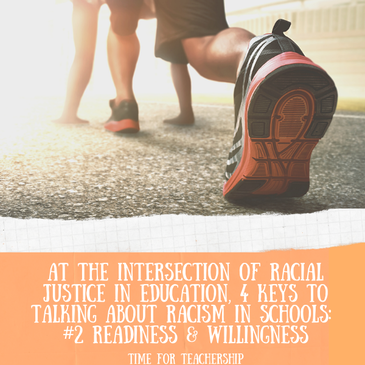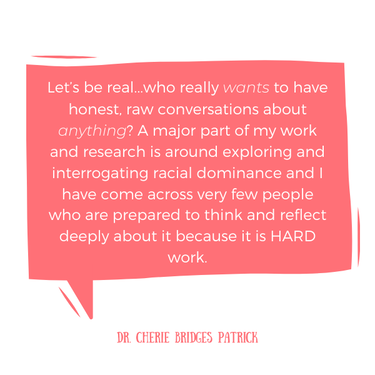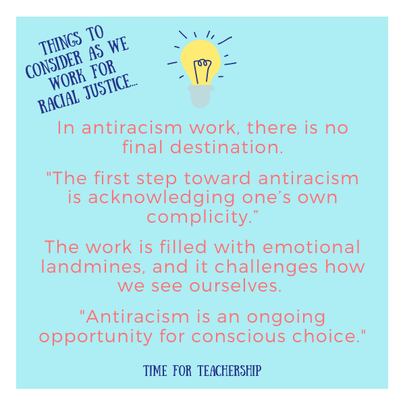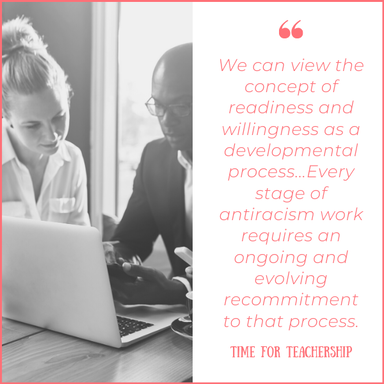|
6/25/2020 At the Intersection of Racial Justice in Education, 4 Keys to Talking About Racism in Schools: #2 Readiness & WillingnessRead NowOur last post introduced the work of Dr. Cherie Bridges Patrick, who is co-authoring a 4-part series of posts on the intersection of racial justice in education. If you haven’t read that post, please do! It offers a great frame for the rest of the posts in the series. In that first post, Dr. Bridges Patrick shared four capacities that contribute to fruitful racial dialogue, which emerged from her research. To recap, they are: 1) readiness and willingness; 2) vulnerability; 3) adaptability; and, 4) a positive, encouraging, liberating dialogic environment. Each of the four posts in this series examines one of the four capacities. Today’s post will discuss: readiness and willingness to engage in antiracism and racial justice work. The term readiness and willingness may seem intuitive, even simplistic, yet in the frame of racial justice work it is complex. Given its complicatedness, we’ll briefly explore the meaning of this capacity. We will connect them to having generative racial dialogue in our next two blog posts. Let’s hear from Dr. Bridges Patrick about readiness and willingness. Let’s be real...who really wants to have honest, raw conversations about anything? A major part of my work and research is around exploring and interrogating racial dominance and I have come across very few people who are prepared to think and reflect deeply about it because it is HARD work. That we are in this moment, at this time is evidence of the ways the truth of race, its origins, its evolution, its abuse, and its power have dominated our lives. Readiness & Willingness. In the context of racial justice, readiness and willingness is being prepared to proceed on a journey for which one never “arrives.” So what does it mean to be ready when there is no final destination? Where do you start? Given the complex, ubiquitous, evolving nature of racial dominance, this is what I would say with the knowledge that I have today. Any topic or work that revolves around race - dialogue, education, healthcare, voting, trauma, healing, policy change, for example, often causes a visceral reaction from many people. From this perspective then, we can view race as a social “construct with teeth” (Menakem, 2020). Numerous educational scholars (hooks, 1992; Jeffery, 2005, 2011; Jeyasingham, 2011) agree that challenging racial inequality through everyday education and instructional practice requires a struggle with core tensions related to race—arguably the most fraught aspect of difference and inequality in American society (Guiner & Torres, 2002; West, 1993). Do Your Own Work - With Accountability Recently, increasing attention has been paid to antiracism and racial justice, and there are numerous resources available (we will provide a brief list in the next blog). For starters, asking oneself a few questions is always helpful. Stop & Think: Why am I (thinking about) doing this work? What is my motivation...honestly? There is ample evidence to suggest that addressing long-standing racial inequities in a substantive way has not been a priority for many...why is this the case and why now? Race scholar Ibram X. Kendi tells us that many Americans are committed to an idea that there is a neutrality – a place where there is no complicity. This idea presents quite a hurdle, particularly because he tells us the first step toward antiracism is acknowledging one’s own complicity. Stop & Think: Let that sink in…”the first step toward antiracism is acknowledging one’s own complicity.” What does that even mean? According to Kendi you’re either working toward antiracism or not. As for the work...doing your own work absolutely requires a thorough on-going inquiry into your own racial identity, history, experiences of internalized racism and whiteness, and how they have and continue to operate in your life. In my role as a leadership coach, accountability from someone who is vested in the growth of others is critical. We tend to think more highly of ourselves and accountability offers opportunities for processing and allows for a more rational (though imperfect) perspective. Accountability is especially useful for those who are in the early stages of antiracism work. A commitment to racial justice is accompanied by risk. Racial dialogue is filled with landmines of emotion for which many are not prepared to navigate. Stop & Think: As you read this, notice what is happening in your body...what physical sensations are you experiencing? (e.g. tension, pain, headache, fatigue, etc.). These sensations are often uncomfortable so many of us avoid them. Loss is a big theme on this journey and it is experienced in many different ways. For example, several years ago a White middle-aged colleague expressed grave fear about wearing a Black Lives Matter t-shirt around her family as she believed they would disown her. Dissonance will make itself known. For example, our identities will be challenged leaving us to face that the kind of person we believe we are is very different than what our actual day-to-day behavior reveals. Uncertainty is likely to become a prominent feature leaving us to guess at what to do in any given moment. Readiness and willingness then encompasses the commitment, purpose, tenacity, and resilience that is necessary to engage in antiracist dialogue and practices. In his book, How to Be an Antiracist, Kendi (2019) tells us that “the only way to undo racism is to consistently identify and describe it–and dismantle it.” Antiracism then is a process that requires ongoing, consistent, intentional observation of our thoughts, words and actions, how they function within us and how they impact others and the larger society. We can view the concept of readiness and willingness as a developmental process that runs parallel to the work of antiracism. Every stage of antiracism work requires an ongoing and evolving recommitment to that process. From this perspective, antiracism is a perpetual opportunity for conscious choice. For teachers, our readiness and willingness are critical to developing racially just schools, creating antiracist policies and pedagogy, and how we talk in the teacher’s lounge. Readiness and willingness means there is a conscious acknowledgment that we are willing to live in uncertainty, willing to fail, to try again, to fail better, and to try better. We often close our posts with an action item, but the action you can take now is to re-read this post, paying particular attention to the “Stop & Think” prompts. Jot an “aha” down on a post-it note, and return to that key idea as you continue to work for racial justice in your schools.
0 Comments
Leave a Reply. |
Details
For transcripts of episodes (and the option to search for terms in transcripts), click here!
Time for Teachership is now a proud member of the...AuthorLindsay Lyons (she/her) is an educational justice coach who works with teachers and school leaders to inspire educational innovation for racial and gender justice, design curricula grounded in student voice, and build capacity for shared leadership. Lindsay taught in NYC public schools, holds a PhD in Leadership and Change, and is the founder of the educational blog and podcast, Time for Teachership. Archives
May 2024
Categories |





 RSS Feed
RSS Feed